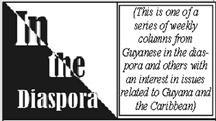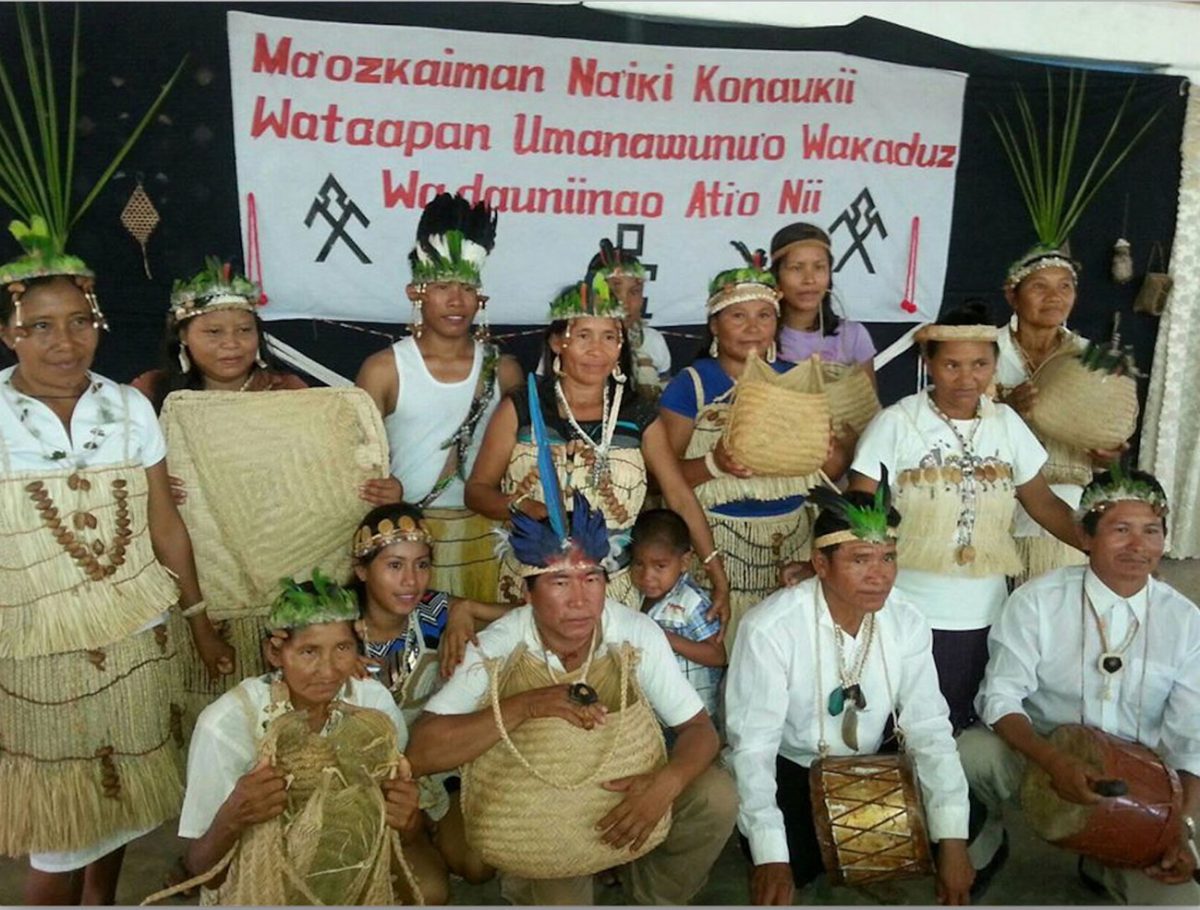 By Immaculata Casimero, Junisha Jonny, Romario Hastings and Medino Abraham
By Immaculata Casimero, Junisha Jonny, Romario Hastings and Medino Abraham
Immaculata Casimero is Wapichan from Aishalton, a women’s rights advocate and chairman of Aisharatoon Women’s Association. Junisha Jonny is Macushi and an indigenous activist. She is a former indigenous queen for region 9 and in 2017, was the first runner up at the national indigenous heritage pageant in Georgetown. Romario Hastings is an emerging indigenous cultural advocate and educator from the KaponAkawaio Nation. He is a graduate of the University of Guyana with a background in Environmental Studies. Medino Felician Abraham is Lokono/Arawak from Moruca. He worked among the indigenous people in the Rupununi and Pakaraimas for 10 years, and holds a Masters in Society and Frontiers from the Federal University of Roraima, Brazil.
Since 1982, the world has celebrated the International Day of the World’s Indigenous Peoples on 9 August, highlighting indigenous contributions to our planet and our common future. Unfortunately, this significant day was not mentioned in any of the local media, despite the fact that the preamble of the Constitution of Guyana recognises “the special place in our nation of the Indigenous Peoples” as well as “their right as citizens to land and security and to their promulgation of policies for their communities”.Today’s column offers some reflections of what August 9 means for us in Guyana.
International Day of the World’s Indigenous Peoples offers an opportunity to reflect on our history, and to recognize that increasing awareness of indigeneity comes from the proactive efforts of indigenous peoples in revisiting our histories and producing studies by and of our own communities that help us learn where we came from and where we are going. It is a day to honour those who continue the struggle of our people for land, those who advocate for women’s rights, those who emphasise the need to decolonize history, beginning with seeing ourselves as indigenous rather than as Amerindians, a name imposed upon us by colonizers.
We are a growing population of approximately 10.5 percent or 78,500 comprised of 9 and more groups concentrated mainly in the interior of the country. Indigenous people’s presence in what is now Guyana is marked by practices of conserving the rainforest and living sustainably with Mother Nature through our unique and rich cultural traditions. We named the places that sustain us with fresh and organic food; creeks, rivers, savannahs, forest and mountains which we call our common home.
Indigenous cosmology offers a different and land-based way of thinking of wealth, and is comprised of our ancestral wisdom, our myths, our art, our languages, our way of producing science, our spirituality, our pre-Columbian knowledge of geography and conservation etc. The United Nations General Assembly proclaimed 2019 as the International Year of Indigenous Languages. The year was intended to raise awareness of the consequences of the endangerment of Indigenous languages across the world, and to establish links between language and ecology, identity, development, peace, and reconciliation. Our languages in Guyana do not only allow us to communicate with each other but they also encapsulate and transmit values, worldviews, history, traditions and culture.
However, because of this worldview, we are labeled by many as backward, or as “irrational, obstructionist” or “anti-development” as noted by Mayan scholar, Filiberto Penados. Meanwhile, our lands and natural resources are at stake for exploitation in the name of development while our culture and languages are in danger of being eroded.
Continued discernment is pivotal as the country’s development is propelled by many institutions and actors that shape our communities – governments, politicians, churches, mining companies etc. We have a role to play in the political arena in the country. Most of us tend to support the two main political parties that sought our ballots and labeled us as “swing votes” during election time, while they simultaneously spread division among us while paying lip service to the rhetoric of unity in the country. Furthermore, in the recent political impasse, indigenous people were also on the receiving end of racist stereotypes and verbal abuse, while for the most part the politicians who sought our votes remained disappointingly silent. Moreover, important elements of an indigenous cosmovision were stifled in discussions of how to take the country forward. The approach to indigenous peoples was largely patronising, as if what comes from the outside (politicians and their one-sided views) is better and as if they are the sole providers of our needs.
With regard to the education we receive, International Day of the World’s Indigenous Peoples means for us that government needs to do more to bridge the disparity in opportunities and learning outcomes that exist between the interior and the coast. More needs to be done to revise the education system to make use of the rich diversity of indigenous methods of learning and pedagogy. Assisting with school feeding and uniform programmes and uniforms is an excellent support, but “quality education” cannot continue to be structured by an approach that assumes that our culture and lifestyles need to be upgraded or left behind. There is much more need for indigenous people to be able to meaningfully collaborate so that we can contribute to an education that caters and recognizes learning from our worldview which could contribute to better academic performance for our children.
With respect to organized religion, some churches still seem to be seeking souls to be converted by teaching morality through the conventional lens of missionaries, most of whom are from outside our communities. Most simply turn a blind eye to us in assisting with our struggles for justice, including on issues of land rights. One reminder to those who would come to evangelize among indigenous communities, seeing our people as passive and materially poor, is that they should nurture the Indigenous world view of the creator, and not the other way around in the name of conversion, because such an approach suffocates traditional understandings of the supreme being, and downplays the perception of the deity from the perspective of our indigenous culture.
International Day of the World’s Indigenous Peoples means addressing the challenges we face with environmental issues that negatively affect us. A serious problem in this regard which affects us is illegal and unregulated mining. Mining destroys the integrity of the ecosystem by clearing forests and leaving huge craters and pits in the ground. With the high price of gold, our villages have seen an influx of miners, even since the pandemic. Who is allowing this? Communities near mining camps are deeply and rightly concerned about the use of mercury. Mercury can seep into nearby creeks and rivers and trigger health problems. These activities bring serious damage to the well–being and good life of the ecosystem and local population. Concomitant effects of mining are prostitution, human trafficking, substance abuse and domestic violence. Another serious issue is illegal and commercial logging, which destroys the habitat of the birds and animals in the forest. These effects are keenly felt within our communities who deplore these destructive influences on our way of life. Illegal mining and logging raise the crucial issue of land demarcation for indigenous peoples. The Intergovernmental Panel on Climate Change (IPCC) has recently recognized us as vital partners in global conservation and climate change efforts. It is no coincidence that our traditional territories cover around 22% of the earth’s land surface but hold 80% of its biodiversity and the granting of land rights for indigenous peoples is a recognized climate change solution since we manage around 24% of the total carbon stored aboveground in the world’s forests.
We are also facing the current COVID-19 pandemic that is spreading through our communities in the interior, caused by mining and porous borders with neighbouring countries. Although government and communities are mobilized to combat the dreaded disease in the interior, far more needs to be done. Furthermore, as a result of the closure of schools in the country to contain the spread of the virus, the majority of indigenous children do not have access to academic lessons virtually, which places them at a disadvantage compared with their counterparts elsewhere in the country where virtual learning is more accessible.
International Day of the World’s Indigenous Peoples means facing the challenge that when we leave our homes in the interior, most of us do not experience decent treatment when we live and work in the city and other areas. Exploitation, discrimination and loneliness are common. Many of us are often left broken and disillusioned by the promises of the good life promoted by the media about city life. Meanwhile our communities suffer the absence of our mothers, fathers, children, relations and leaders. Additionally, top-down approaches to indigenous development are too often paternalistic and tend to create the mentality that what comes from the outside is better than what indigenous peoples have possessed for centuries, resulting in many neglecting our rich cultural traditions and opting for a superficial and alienating lifestyle to live by. Furthermore, because external projects are often designed without local input and empowerment, they fail when funding is over and personnel move on. The impact of these activities is significant, for they are rapidly reconfiguring and transforming most elements of our original customs and presenting a threat to the local languages particularly of the (young generation).
The cultural patrimony of indigenous people in Guyana has survived external influences for centuries, and this is what we celebrate when we observe International Day of the World’s Indigenous Peoples. As we navigate old and new challenges, we draw our indigenist inspiration and insight from principles of communality, solidarity, reciprocity, social justice, equality, complementarity and harmony with nature, values that are essential to living in the modern world while simultaneously retaining our rich cultures.






